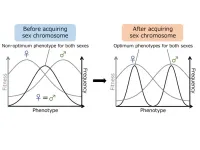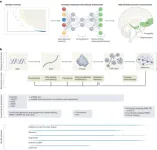Strengthening global regulatory capacity for equitable access to vaccines in public health emergencies
2024-08-03
(Press-News.org) WASHINGTON – Three high-impact steps could be taken by global health leaders to reshape the global regulatory framework and help address the pressing need for equitable access to diagnostics, therapeutics, and vaccines during public health emergencies, say a Georgetown global health law expert and a medical student.
In their “Perspective” published today in the New England Journal of Medicine, Georgetown School of Health professor Sam Halabi, JD, and George O’Hara, a Georgetown medical student and David E. Rogers Student Fellow, say these reforms aim to enhance the capacity of national regulatory bodies, particularly in low- and middle-income countries to ensure timely and safe access to essential medical products.
The U.S. Food and Drug Administration (FDA) and a select group of national regulatory authorities currently dominate the approval process for medical products. However, this concentration of regulatory capacity in high-income countries has led to bottlenecks and delays in the distribution of critical medical supplies during emergencies, as seen during the COVID-19 pandemic.
A recent analysis highlights that few national regulatory bodies, primarily in high-income countries, meet the World Health Organization's (WHO) stringent criteria for being "highly performing." Approximately three-quarters of WHO member states lack the regulatory maturity to assure their populations of the quality of medical products, including vaccines.
To address these weaknesses, Halabi, who directs the Center for Transformational Health Law at the O'Neill Institute for National and Global Health Law, and O’Hara propose three key measures for the WHO and global health leaders:
Expand Regulatory Coordination and Planning: The WHO should actively engage in focused planning with national regulatory authorities that have achieved advanced maturity levels. This includes integrating regulators from countries like Korea, Saudi Arabia, and Singapore into a regional coordination initiative for dossier review and approval during emergencies.
Leverage Regional and Multilateral Development Banks: Development banks should agree to extend loans for procuring medical products approved by WHO-listed authorities with a given certification. This would alleviate the bottlenecks and access issues exacerbated by the dependence on WHO's Emergency Use Listing designation during the COVID-19 pandemic.
Promote Regulatory Flexibility in Pandemic Agreements: As negotiators finalize a global pandemic agreement, provisions should focus on a coordinated and multilateral approach to leveraging emerging regulatory capacity. By decentralizing regulatory review and expanding the approval process to include authorities from countries with stronger regulatory systems, LMICs can secure vaccine doses earlier in future pandemic responses.
“Together, these steps can drive more cohesive responses to future public health emergencies,” write Halabi and O’Hara.
The WHO has already initiated steps to reduce reliance on the European Medicines Agency and the FDA by creating a new framework of WHO-listed authorities to replace the stringent regulatory authority designation. However, the authors stress the need for additional efforts to ensure greater national control over vaccine supply and reduce dependence on global entities like COVAX.
“Expansion of regulatory pathways would prioritize public health by enabling diagnostics, therapeutics, and vaccines to reach populations sooner,” they write. “By taking incremental but high-impact steps based on the WHO’s classifications of regulatory systems, global health leaders can mount a more equitable and rapid response.”
###
O’Hara’s work was supported by a David E. Rogers Student Fellowship Award.
END
ELSE PRESS RELEASES FROM THIS DATE:
2024-08-03
Tokyo, Japan – Researchers from Tokyo Metropolitan University have taken a big step in solving the mystery around why animals evolve sex chromosomes. It had long been proposed that sex chromosomes evolve to reduce “sexual conflict,” the evolution of features which are sub-optimal for either sex. By using fruit flies, the team showed that genes on newly formed neo-sex chromosomes in fruit flies tend to evolve “sex-biased genes” which give sex-specific phenotypes.
Chromosomes are neatly packaged bundles of DNA that carry all the genetic material of an organism. While prokaryotes ...
2024-08-02
A research team led by engineers at the University of Virginia School of Engineering and Applied Science is the first to explore how an emerging plant-based material, cellulose nanofibrils, could amplify the benefits of 3D-printed concrete technology.
“The improvements we saw on both printability and mechanical measures suggest that incorporating cellulose nanofibrils in commercial printable materials could lead to more resilient and eco-friendly construction practices sooner rather than later,” said Osman E. Ozbulut, a professor in the Department of Civil and Environmental ...
2024-08-02
Technology with roots going back to the Bronze Age may offer a fast and inexpensive solution to help achieve the United Nations climate goal of net zero emissions by 2050, according to recent Stanford-led research in PNAS Nexus.
The technology involves assembling heat-absorbing bricks in an insulated container, where they can store heat generated by solar or wind power for later use at the temperatures required for industrial processes. The heat can then be released when needed by passing air through channels in the stacks of “firebricks,” thus allowing cement, steel, glass, and paper factories to run on renewable energy even when wind and sunshine ...
2024-08-02
Patrick Sullivan, MD, FRANZCP, the Yeargan Distinguished Professor of Psychiatry and Genetics at the UNC School of Medicine, and researchers at the Karolinska Institutet in Stockholm, Sweden, have developed a comprehensive outline of the genetics of schizophrenia. The review was published in Nature Reviews Neuroscience.
Schizophrenia is a neuropsychiatric disorder featuring recurrent episodes of psychosis – such as hallucinations, delusions, and disorganized thinking – with many patients developing apathy, social withdrawal, ...
2024-08-02
In a new review paper, researchers from the Universities of Arizona, Oxford and Leeds analyzed dozens of previous studies into long COVID to examine the number and range of people affected, the underlying mechanisms of disease, the many symptoms that patients develop, and current and future treatments.
Long COVID, also known as Post-COVID-19 condition, is generally defined as symptoms persisting for three months or more after acute COVID-19. The condition can affect and damage many organ systems, leading to severe ...
2024-08-02
COLUMBUS, Ohio – The rising earth beneath the Antarctic Ice Sheet will likely become a major factor in future sea level rise, a new study suggests.
Despite feeling like a stationary mass, most solid ground is undergoing a process of deformation, sinking and rising in response to many environmental factors. In Antarctica, melting glacial ice means less weight on the bedrock below, allowing it to rise. How the rising earth interacts with the overlying ice sheet to affect sea level rise is not well-studied, said Terry Wilson, co-author of the study and a senior research scientist at the Byrd Polar and Climate Research Center ...
2024-08-02
Rebecca Robbins, PhD, of the Division of Sleep and Circadian Disorders at Brigham and Women’s Hospital, is the senior author of a paper published in Psychiatry Research, “Exploring sleep difficulties, alcohol, illicit drugs, and suicidal ideation among adolescents with a history of depression.”
How would you summarize your study for a lay audience?
Suicide is one of the leading causes of death for adolescents in the U.S. We know, due to previous research, that difficulty falling asleep or waking up too early as well as abuse of prescription ...
2024-08-02
Giving children a right to be heard and taken seriously when parents separate could help couples reach sustainable child arrangements and relieve significant backlogs in the family court, avoiding unnecessary financial and emotional costs, a new study says.
Mediation, court and legal processes should provide a forum for young people’s views on post-separation arrangements being considered for them to be aired independently and factored in wherever appropriate. Giving them more agency about decisions which affect their lives and futures will help families make more effective ...
2024-08-02
A McGill-led study suggests that Earth's natural forces could substantially reduce Antarctica’s impact on rising sea levels, but only if carbon emissions are swiftly reduced in the coming decades. By the same token, if emissions continue on the current trajectory, Antarctic ice loss could lead to more future sea level rise than previously thought.
The finding is significant because the Antarctic Ice Sheet is the largest ice mass on Earth, and the biggest uncertainty in predicting future sea levels is how this ice will respond to climate change.
“With nearly 700 million people living in coastal areas and the potential ...
2024-08-02
Scientists at Sanford Burnham Prebys and Salk Institute for Biological Studies have uncovered a new role for a protein known for its role in the brain helping control feelings of hunger or satiety, as well as in the liver to aid the body in maintaining a balance of energy during fasting. The new study shows that this protein also supports the maintenance of heart structure and function, but when it is overactive it causes thickening of the heart muscle, which is associated with heart disease.
Excessive thickening of the heart muscle—known as cardiac hypertrophy—is often ...
LAST 30 PRESS RELEASES:
[Press-News.org] Strengthening global regulatory capacity for equitable access to vaccines in public health emergencies




